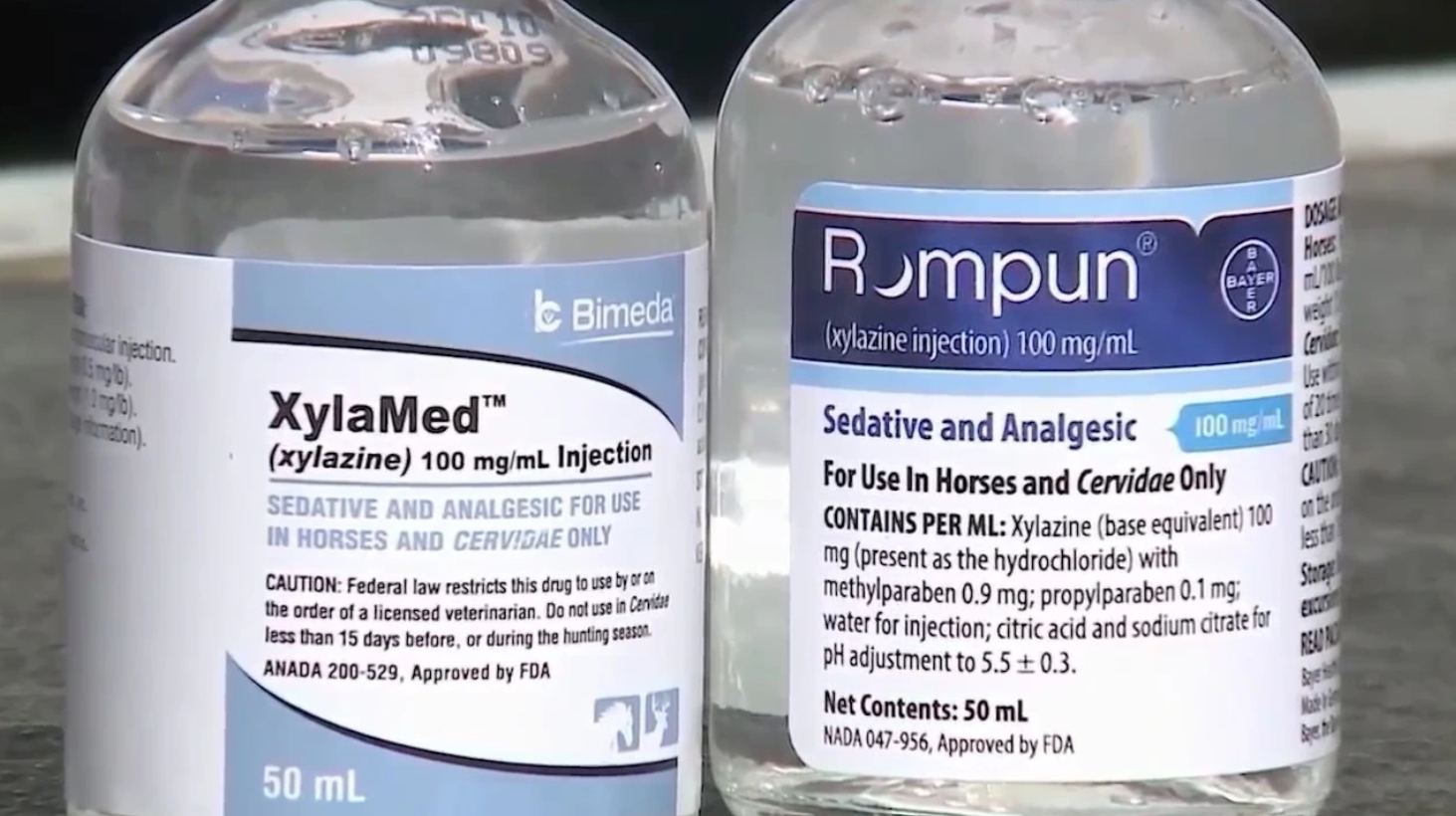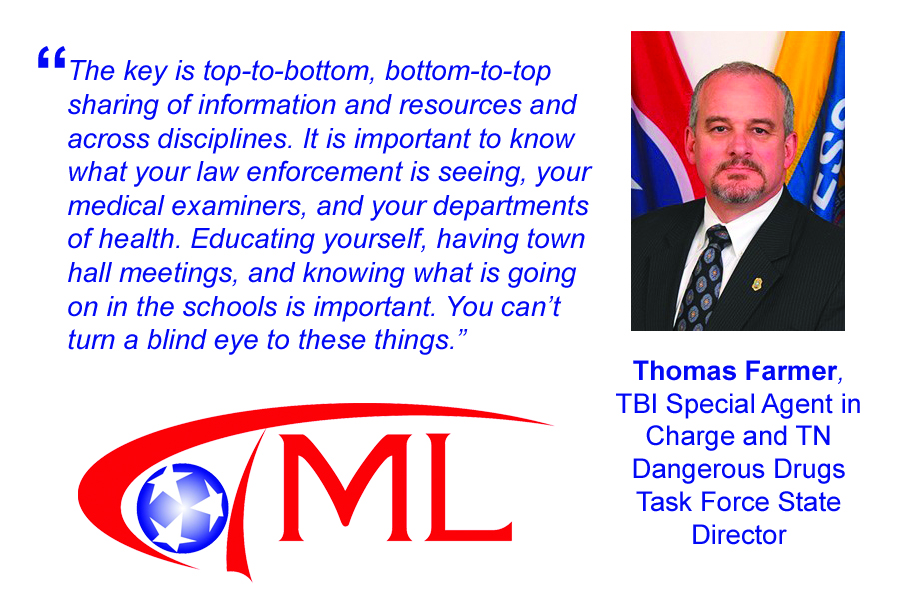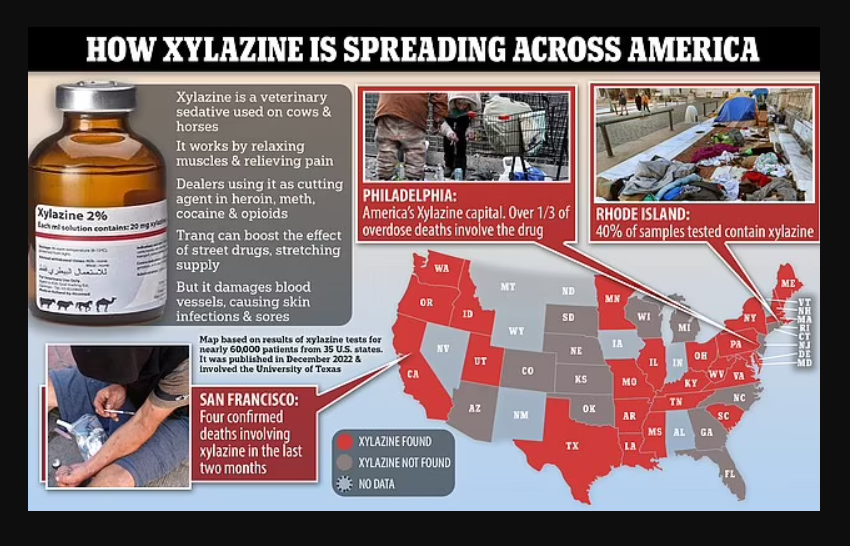TBI: Education, communication needed to combat new xylazine threat
By KATE COIL
TML Communications Specialist
Tennessee Bureau of Investigation (TBI) officials are encouraging local officials to educate themselves and the public about a new drug being linked with overdose deaths nationwide.
The Drug Enforcement Agency (DEA) recently issued a warning to the American public about a sharp increase in the trafficking of fentanyl mixed with xylazine, also known as “tranq.” Xylazine is a non-opioid veterinary tranquilizer most commonly used on horses and not approved for human use. In fact, human testing for the drug was shut down in the 1960s after xylazine was shown to have negative effects on human subjects, like respiratory depression and low blood pressure.

The CDC reported 107,735 Americans died between August 2021 and August 2022 from drug poisonings, with 66% of those deaths involving synthetic opioids like fentanyl. The DEA has reported xylazine and fentanyl mixtures have been detected in labs in 48 of 50 states with Pennsylvania, Maryland, and Connecticut reporting some of the most alarming trends.
TBI Deputy Director Brad Nealon recently addressed members of the Tennessee Municipal League about the agency’s concerns over xylazine and other crime trends at the TML Legislative Conference in Nashville.
“The bureau has an advantage in seeing some of the trends that are coming forth through reporting by local agencies to our TIBRS system and our crime labs across the state,” Nealon said. “In our crime labs, for example, 98% of what we process is more local than the other state agencies. We’ve all dealt with and heard about the opioid crisis for years. That really began with prescription drugs, but has morphed into other ones."
Nealon said fentanyl remains the second-most common drug detected in TBI labs, but an alarming new trend is the detection of xylazine along with it. While xylazine has come back on TBI lab reports as early as 2019, Nealon said there was a spike in detections last year.
“While 157 submittals in the state of Tennessee may not seem like a lot, going from virtually nothing to this is a big deal,” he said. “In 2020, there were 57 deaths associated with xylazine and there were 94 in 2021. That continues to grow. What we are seeing is not individual deaths with xylazine; it is always mixed with other drugs.”
Thomas Farmer, special agent in charge with the TBI and state director of the Tennessee Dangerous Drugs Task Force, said xylazine is used as an adulterant or cutting agent in combination of other drugs like fentanyl. The fact that it is available on the veterinary market may also make it easier to obtain than other similar substances, and it is also cheaper than other agents that are used for similar purposes.
“Xylazine acts as a respiratory depressant and can slow down the metabolism,” Farmer said. “In slowing down the metabolism, it intensifies the high. It itself as a muscle relaxant doesn’t make the person high, but it makes the effects of what is in that person’s system last longer and intensifies the high. It being used as an adulterant does pose significant harm to the individual that is using the drug. One of the long-term effects of the drug is a rot. We do have some examples in Tennessee already where we have seen significant muscle decay and nasty scars at the injection site.”
 The National Institute on Drug Abuse (NIDA), a part of the National Institute of Health (NIH), has confirmed similar harmful side effects of the repeated use of fentanyl cut with xylazine including “kin ulcers, abscesses, and related complications," such as eruptions of a scaly, dead tissue known as eschar. When left untreated, eschar can result in the need to amputate both the unhealthy skin and in some cases, large portions or entire appendages. Some users have also found themselves unconscious for hours as a side effect of the drug, which has left many users vulnerable to robbery and physical attack.
The National Institute on Drug Abuse (NIDA), a part of the National Institute of Health (NIH), has confirmed similar harmful side effects of the repeated use of fentanyl cut with xylazine including “kin ulcers, abscesses, and related complications," such as eruptions of a scaly, dead tissue known as eschar. When left untreated, eschar can result in the need to amputate both the unhealthy skin and in some cases, large portions or entire appendages. Some users have also found themselves unconscious for hours as a side effect of the drug, which has left many users vulnerable to robbery and physical attack.
Because it is a non-opioid, the use of xylazine in mixture with other drugs can mean those who overdose from this combination may not respond to overdose reversal medication like Naloxone.
“A side effect to xylazine is that it operates as a respiratory depressant and slows down the system as well as fentanyl or opioid slows down the system,” Farmer said. “Where that becomes a problem is when we introduce Narcan to that system, it knocks out the opioid. It does not work on xylazine.”
In fact, TBI officials said one of the earliest indicators many law enforcement and first responders receive they are dealing with xylazine is that patients are not responding to Narcan typically. Often times, more than the typical dose of Naloxone is needed to revive these overdose victims, if it works at all.
Darryl Richardson, assistant director of the TBI Drug Investigation Division, said it often isn’t until substances are submitted to the lab and technicians break down what the exact chemical components of the substance are that it can be verified that xylazine is part of the combination.
“Sadly, more often than not, we can be aware of it and the word is already out that it is circulating in ours and other states, but we aren’t going to recognize it until a death or we are notified of it,” Richardson. “A substance may say ‘fentanyl’ when it is submitted to the lab. It will be tested and broken down further, which is when we may identify the xylazine. By that time, most of the time, a death has already occurred from it.”

While xylazine may not be the most common drug reported on TBI lab tests, Farmer said the major concern about xylazine is its association with deaths.
“It’s significant because it’s causing more overdoses and more deaths,” he said. “The faster we can identify that there is something else in there, the better. Unfortunately, it if it gets to the medical examiner first, it resulted in a death. Xylazine is significant in that it is causing overdoses. We look at is it causing death and how widespread those deaths are.”
Richardson said xylazine usage is being reported in all three grand divisions of the state, but often those reports are coming after it has already contributed to a death.
“It has popped up in all three regions,” he said. “We’ve seen it in Knoxville, Nashville, and Memphis, but more so in East Tennessee. That is where we continue to see more of it. Second to that is the middle part of the state. Our friends at the medical examiners’ offices started raising the red flags that it was popping up in a lot of their tests, and we noticed it was popping up in our lab tests as well.”
The use of xylazine may also be underreported nationwide because not all state and national labs are required to test for it. Xylazine is not yet a controlled substance under the federal government or state of Tennessee, which may make it easier to be ordered online from foreign companies or locations. Work is being done with pending state and federal legislation, but there is some pushback from veterinary groups.
“We understand because there is a legitimate use out there,” Farmer said. “This is always the balance we have to take to make sure we can protect public safety and public health and while keep the veterinarians or those who could be adversely affected by that legislation from being too adversely impacted. We are looking on the state level at making this a Schedule III, and I don’t see any need of it going to a Schedule I or Schedule II.”

Education and prevention are some of the biggest tools to fight new concerns like xylazine. Public officials – both law enforcement, emergency responders, and others – can help by educating themselves and then, in turn, educate citizens about what threats are out there.
“I think the key thing is to share the alerts that are sent out by Tennessee Mental Health, DEA, and us,” Richardson said. “TBI collaborates with mental health and we have quarterly meetings with the Dangerous Drugs Task Force where this information is shared. There are members from local municipalities from across the board. They go back with that information, and it is key to get it out there. We also need to share information with addictive persons so they know what is out there. I think dialogue and communication is key.”
Farmer said it also important for local agencies to communicate with the state because they are often the first to see what is happening in the state.
“Staying connected, staying plugged in, and communicating are essential,” he said. “We have to have that, because we need to know what is going on and what is being seen. If there is a problem, that problem is going to be at the local level. You may go to the state or federal government for funding, but the solution is often at the local level. The key is top-to-bottom, bottom-to-top sharing of information and resources and across disciplines. It is important to know what your law enforcement is seeing, your medical examiners, and your departments of health. Educating yourself, having town hall meetings, and knowing what is going on in the schools is important. You can’t turn a blind eye to these things.”
In addition to information, collaboration can also be important to meeting these crises head-on.
“Drug dealers don’t stop at county lines or city limits,” Richardson said. “We aren’t in the money-making business, but we are in a business that can impact your budgets. If your law enforcement and emergency services are out doing what they should be doing, and you enable them to do what they should be doing, they are going to do it much better. Your community is going to reap the advantages of that.”
Anyone struggling addiction or substance use disorder can call or text the TN REDLINE at 800-889-9789 for confidential referrals.
